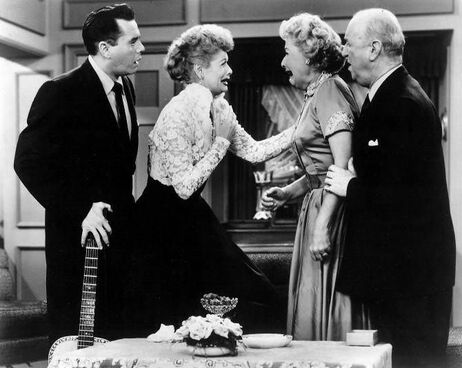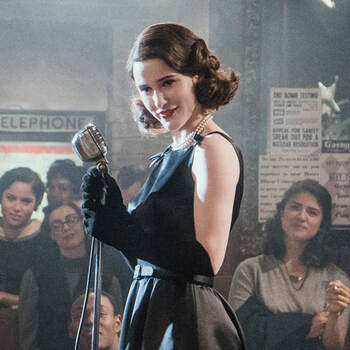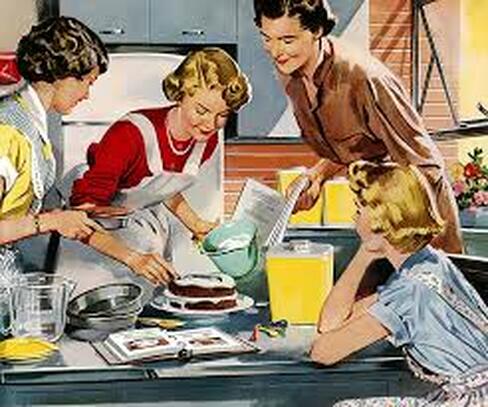“Did you learn that from your husband?” Why America thinks women aren’t funny, and how we battle that stereotype.
--Edrisina Sklar

You have probably heard the phrase “women aren’t funny, ” at some point in your life. This is a trope that we generally associate with repressive housewife culture, or something that someone in today’s political debacle probably said at some point on live television, but believe it or not this stereotype is more common than most would assume.
A bit of background information:
This myth persists for the same reason that some people think that women aren’t smart. In order to be funny, you have to be witty, in order to be witty, you have to be smart, and in order to be smart, you- supposedly- have to have to be male. This raises an interesting question: what aspect of the man invokes humor? Is it purely a chromosome related matter, or does the essence of humor stem from the prostate itself? ( Sorry, that last bit didn't turn out nearly as funny as I wanted it to, but what’s a girl to do?)
These common stereotypes are very commonly associated with the ideal American woman. The one you see in nineteen fifties family shows. She is a staple of American culture. Elegant and poised, she has dinner on the table at exactly the same time every night. She cleans impeccably, and somehow manages to keep Little Timmy (or whatever his name is) from illiteracy, even though the kid never seems to be at school. Her husband will come home at the end of the day, toss his coat and hat frivolously onto the sofa cushions she’s just finished arranging, kiss her, and sit down to his dinner which is hot and ready on the table. She has no other life but the one in the home, and no other desire but to please her husband and keep the house spick and span.
What is interesting about many of these shows, is that they are usually comedy shows, and the wife plays a key role in the humor.
Problematic Portrayls
In the widely popular show, I Love Lucy for instance, every episode is another hilarious mess Lucy gets herself into as a result of her silly womanly whims. The show relies on classic physical comedy to show Lucy engaged in various different disasters. Most of the time her husband Ricky, exasperated with her foolishness, will play some sort of trick on her to teach her a lesson before helping her out of her mess.
At first glance, a show like I Love Lucy plays up the titular star as the center of its humor; however, a closer look reveals that Desi gets the witty one liners while Lucy performs slapstick. This creates a dynamic where the audience is meant to laugh with the men, and at the women. We are always in on Ricky and his friendm Fred’s clever tricks, and half the comedy of the show is watching Lucy and her best friend Ethel stumble around in the dark, completely unaware of whatever humbling prank the husbands are about to play on them.
This isn’t to say that Lucille Ball’s contribution to American Television should be disregarded; in fact, her beloved presence on televisions on a nightly basis likely inspired new generations of women to chase ambitious careers. However, is it still important to note the deeper meaning of the humor that this show portrays.
Hope in a new era
A film series which strives to overcome this trope:

In 2017, Amazon released a new series called The Marvelous Mrs.Maisel. Starring Rachel Brosnahan, the series takes place in 1950s Manhattan, and follows a woman chasing a career in stand up comedy. The show tackles sexism along with the stigma around women and humor. The main character, Miriam, often uses the male push back she gets as material for her acts, bluntly addressing the challenges she faces in a Man’s World, and tearing apart the stereotype. In one episode, Miriam takes down one of the cocky male comics that had been harassing her in her set. She starts by cracking jokes at their individual expense, but soon moves onto the bigger picture. “Men think that they are the only ones who get to use comedy to close up those holes in their sole. They run around telling anyone that women aren’t funny-that only men are funny. Comedy is fueled by oppression. By the lack of power. By sadness and disappointment, by abandonment and humiliation. Now who the hell does that describe more than women? By those standards ONLY women should be funny.” (The Marvelous Mrs.Maisel, Rachel Brosnahan)
While the stereotype that “women aren’t funny” is engraved deeply in American culture, and continues to persist today, there are also endeavors in progress to vanquish this ridiculous accusation.
I have hope that someday I will pick up the remote and scroll through multitudes of performances by the many hilarious, witty, and smart women who deserve to be laughed with. I will prepare a monstrous amount of popcorn and proceed to laugh so loud that sexist tropes can no longer be heard above me.
While the stereotype that “women aren’t funny” is engraved deeply in American culture, and continues to persist today, there are also endeavors in progress to vanquish this ridiculous accusation.
I have hope that someday I will pick up the remote and scroll through multitudes of performances by the many hilarious, witty, and smart women who deserve to be laughed with. I will prepare a monstrous amount of popcorn and proceed to laugh so loud that sexist tropes can no longer be heard above me.


